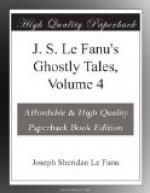With clasped hands, in an agony of supplication, she prayed that God would, in his mercy, spare her little child—that, justly as she herself deserved the sorest chastisement his hand could inflict, he would yet deal patiently and tenderly with her in this one thing. She poured out her sorrows before the mercy-seat—she opened her heart, and declared her only hope to be in his pity; without which, she felt that her darling would only leave the bed where she was lying for her grave.
Exactly as she came to this part of her supplication, the child, who had grown, as it seemed, more and more restless, and moaned and muttered with increasing pain and irritation, on a sudden started upright in her bed, and, in a thrilling voice, cried—
“No! no!—the baby first.”
The mysterious sentence which had secretly tormented her for so long, thus piercingly uttered by this delirious, and, perhaps, dying child, with what seemed a preternatural earnestness and strength, arrested her devotions, and froze her with a feeling akin to terror.
“Hush, hush, my darling!” said the poor mother, almost wildly, as she clasped the attenuated frame of the sick child in her arms; “hush, my darling; don’t cry out so loudly—there—there—my own love.”
The child did not appear to see or hear her, but sate up still with feverish cheeks, and bright unsteady eyes, while her dry lips were muttering inaudible words.
“Lie down, my sweet child—lie down, for your own mother,” she said; “if you tire yourself, you can’t grow well, and your poor mother will lose you.”
At these words, the child suddenly cried out again, in precisely the same loud, strong voice—“No! no! the baby first, the baby first”—and immediately afterwards lay down, and fell, for the first time since her illness into a tranquil sleep.
My good little wife sate, crying bitterly by her bedside. The child was better—that was, indeed, delightful. But then there was an omen in the words, thus echoed from her dream, which she dared not trust herself to interpret, and which yet had seized, with a grasp of iron, upon every fibre of her brain.
“Oh, Richard,” she cried, as she threw her arms about my neck, “I am terrified at this horrible menace from the unseen world. Oh! poor, darling little baby, I shall lose you—I am sure I shall lose you. Comfort me, darling, and say he is not to die.”
And so I did; and tasked all my powers of argument and persuasion to convince her how unsubstantial was the ground of her anxiety. The little boy was perfectly well, and, even were he to die before his sister that event might not occur for seventy years to come. I could not, however, conceal from myself that there was something odd and unpleasant in the coincidence; and my poor wife had grown so nervous and excitable, that a much less ominous conjecture would have sufficed to alarm her.




